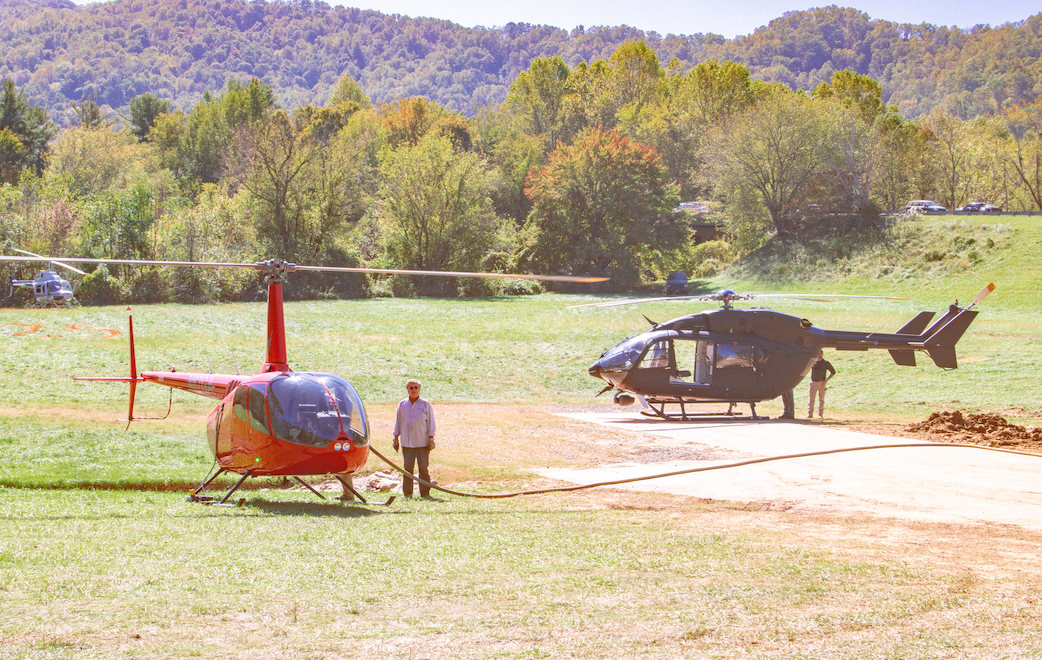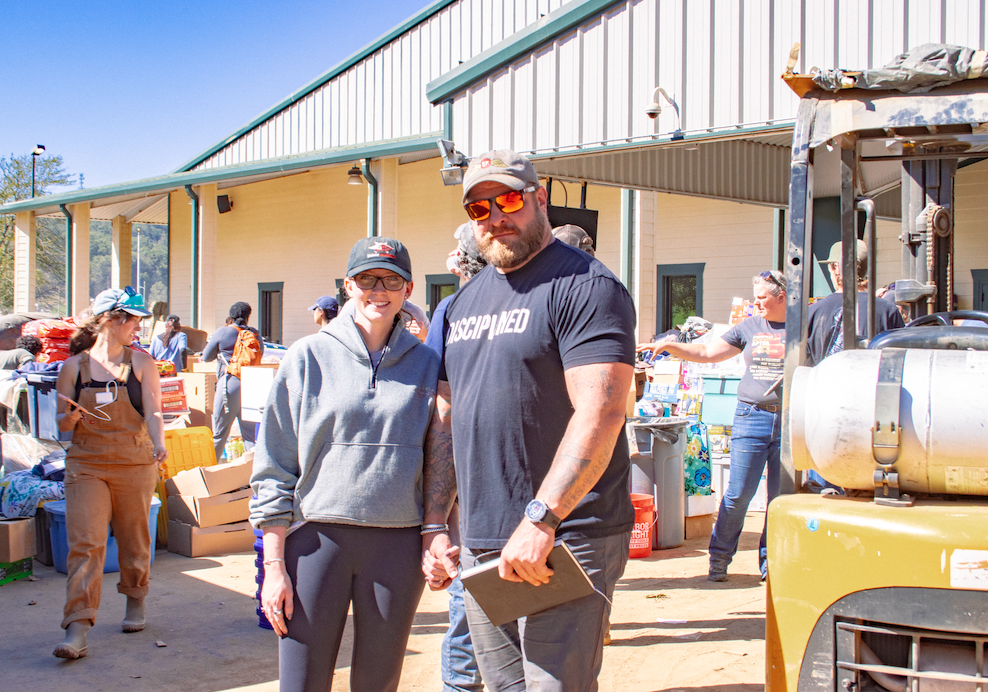Whirring helicopter blades cut the air as Taylor Knipp crosses the lot at the Harley-Davidson of Asheville dealership in Swannanoa. The location is a hive of activity — volunteers hustle to load trucks and pallets, while forklifts stack crates full of food, water, generators and medical supplies.
Since Tropical Storm Helene devastated the region, Knipp and her fiancé, Adam Smith, have transformed the site into the Savage Freedoms Relief Operation — an ad hoc private air base running daily rescue, reconnaissance and resupply missions to some of the hardest-hit areas in Western North Carolina.
“On any given day we’ve had up to 30 … aircraft land,” Knipp says. “We can accommodate up to nine helicopters at a time. We’ve had over 100 different helicopters and upwards of 200 pilots since this all started.”
But the group’s origin story, Knipp continues, began with a single rescue mission in mind.
All-volunteer operation
The steady stream of helicopters makes the relief and supply operation feel like a military base.
And in a way, that’s what it is.
Smith — who was on a supply run at Statesville Regional Airport during Xpress‘ visit to the Swannanoa location — is a veteran of the U.S. Army Special Forces. He and Knipp’s all-volunteer workforce includes private pilots, former special operations personnel, off-duty firefighters and National Guard members as well as members of nonprofits such as the Civilian Critical Response Team and Charlie Mike.
The operation also has medical personnel on-site at all times, Knipp says, including nurses, paramedics and emergency medical personnel as well as doctors. This revolving roster of health care workers helps deliver donated medical supplies including oxygen, insulin and prescriptions.
Additionally, the volunteer air force has been distributing Starlink kits to remote rural areas. Initially, they focused on fire departments. But more recently the delivery has expanded to community hubs.
“For communities that we couldn’t get to other than by air, we drop off a generator and a Starlink unit and some fuel,” Knipp explains. “We can then communicate with that community, and they can let us know exactly what they need [and] when they need it.”
‘The capacity to help’
Knipp says Savage Freedoms Relief Operation has been coordinating its efforts with the National Guard and local sheriff’s departments.
“We have a point of contact at all the different fire stations,” she explains. “Since day one, we’ve been building that network. We wanted to have contacts at every place.”
But the rescue operation has not collaborated with the federal government.
“FEMA was at our gate this morning [on Oct. 8] talking to us. That’s the first we’ve seen them,” Knipp says. “[FEMA] just offered help and assistance. We politely declined, and they went on their way.
“The biggest difference between what we’re doing and the response system that’s already in place at the federal level is response time,” Knipp continues. “There’s a lot of red tape when it’s government entities. There’s a lot of approval that has to happen versus civilians who can bring their aircraft here right now and we’re good to go.”

Darrell Habisch, public information officer with Federal Emergency Management Agency, says there is a misunderstanding about how the federal agency operates.
“Most of what we do is in coordination with other agencies,” says Habisch, who spoke with Xpress on Oct. 10. “You don’t see FEMA logos and FEMA trucks [because] we are in a support role. Whether or not [people] see personnel branded as FEMA, that doesn’t mean that we aren’t there.”
What people do see is the result of the support and cooperation that FEMA is providing, Habisch continues. That includes $70 million in housing and other types of assistance for over 57,700 households in Western North Carolina.
The agency is also paying hotels to shelter more than 1,250 households through FEMA’s Transitional Sheltering Assistance program, while approximately 45 mobile sites have begun delivering meals across 13 counties, Habisch says.
On Oct. 9, FEMA opened a disaster recovery center at A.C. Reynolds High School, 1 Rocket Drive, Asheville. The center, a one-stop shop where survivors can receive in-person help as they navigate their recovery process, is open Monday-Sunday, 8 a.m.-7 p.m.
Back at the Swannanoa base, volunteer Matt Dodge offers Xpress a closer look at some of the helicopters. Amid the inspection, Dodge — a 20-year veteran and former Army Ranger — provides his take on Savage Freedoms Relief Operation.
“What we have here is guys that are used to being in austere environments where not a lot is going right, and then the job is to figure out how to make it go right,” he says. “There are a lot of people here who have been in situations like this, and have the capacity to help.”
First mission
Before blossoming into a homegrown air force and supply chain, Savage Freedoms Relief Operation had a single goal — saving a family.
In the wake of Tropical Storm Helene, Smith was unable to reach his ex-wife, Megan Smith, and his daughter, Tove, who live alongside the Broad River.
“We tried to get to the house, which is 7 miles from here, and the road was a mudslide on one end, completely missing at the other,” Knipp says.
The couple drove to South Carolina, where they got in touch with Smith’s friend Jon Paramore, a St. Louis-based business consultant. Paramore connected Smith and Knipp with Aaron Rudolph, a pilot and owner of a helicopter. Smith, who lives near Swannanoa, is an avid motorcycle rider; familiar with the open field at the Harley-Davidson dealership, he directed Rudolph to land there.
“We just showed up,” Knipp says.
Shortly after, Rudolph took off with Smith to rescue his family. Megan and Tove are safe and have since moved in with family in Asheville.
Megan Smith is helping with Savage Freedoms’ relief efforts.
The next phase
Since that initial rescue, the operation has snowballed. Working with Rudolph, Smith and Knipp started dropping supplies to neighbors who were stranded without resources. Smith’s reputation in survivalist circles quickly drew a growing roster of volunteers — as well as a visit from Ivanka Trump.
As pilots rallied to the site in Swannanoa, Smith placed a call to the Federal Aviation Administration, which has provided the flyers with squawk codes — four-digit sequences that air traffic control uses to identify aircraft when they are flying, says Knipp.
Meanwhile, Paramore launched a GoFundMe to cover the operation’s costs for fuel, water, helicopter maintenance and pilot fees, with all donations going to Smith and his company, Savage Freedoms LLC. As of Oct. 11, the page had raised $315,620 from over 2,300 small donors. The goal is to raise $500,000. Top donors include John Watch and David Adams, who chipped in $5,000 apiece.
With permission from the Harley-Davidson dealership’s owner, Douglas J. Rudd, Smith and Knipp started connecting supplies with pilots on-site and began coordinating their efforts with emergency management services.
“In the beginning, we were dropping a lot of supplies to the different fire departments, and they were dispersing them from there,” Knipp says.
But with many of the distribution centers full and no longer accepting supplies, the operation has begun stockpiling donations at the dealership.
Communities, Knipp notes, will eventually need to be resupplied. And when they do, she continues, the operation will have them covered.
In the meantime, the operation works on mapping out its latest needs. “Right now, we’re trying to find big shipping containers that we can set up at different communities or fire departments,” Knipp says. “Because they can store supplies like cold-weather gear, sleeping bags and space heaters and have them ready to go.”
The group’s ongoing goal is to rely on local support.
“Rather than bringing outside companies in to do the restoration … we let the people that live here — [who] have companies that can do it — rebuild their own community,” Knipp says. “That’s the idea.”
Savage Freedoms Relief Operation has a hotline at 888-618-0504 where people can request assistance or volunteer.




Before you comment
The comments section is here to provide a platform for civil dialogue on the issues we face together as a local community. Xpress is committed to offering this platform for all voices, but when the tone of the discussion gets nasty or strays off topic, we believe many people choose not to participate. Xpress editors are determined to moderate comments to ensure a constructive interchange is maintained. All comments judged not to be in keeping with the spirit of civil discourse will be removed and repeat violators will be banned. See here for our terms of service. Thank you for being part of this effort to promote respectful discussion.